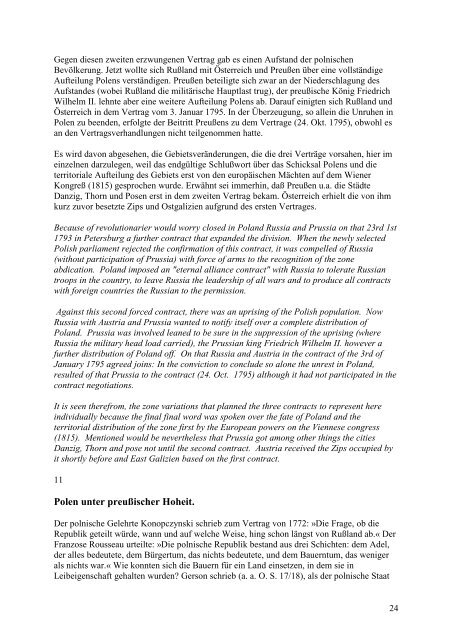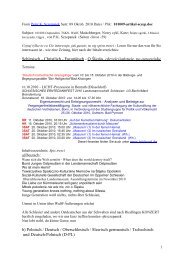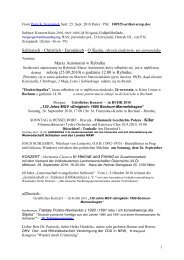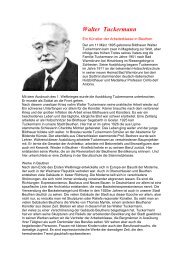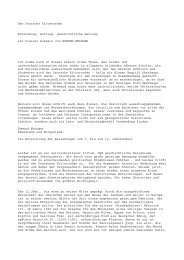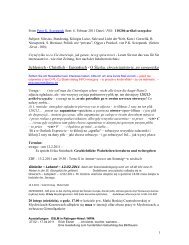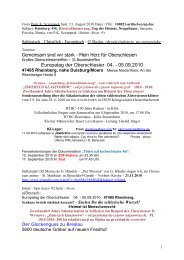O Śląsku, chrześcijaństwie, po europejsku a)Deutsch
O Śląsku, chrześcijaństwie, po europejsku a)Deutsch
O Śląsku, chrześcijaństwie, po europejsku a)Deutsch
Erfolgreiche ePaper selbst erstellen
Machen Sie aus Ihren PDF Publikationen ein blätterbares Flipbook mit unserer einzigartigen Google optimierten e-Paper Software.
Gegen diesen zweiten erzwungenen Vertrag gab es einen Aufstand der <strong>po</strong>lnischen<br />
Bevölkerung. Jetzt wollte sich Rußland mit Österreich und Preußen über eine vollständige<br />
Aufteilung Polens verständigen. Preußen beteiligte sich zwar an der Niederschlagung des<br />
Aufstandes (wobei Rußland die militärische Hauptlast trug), der preußische König Friedrich<br />
Wilhelm II. lehnte aber eine weitere Aufteilung Polens ab. Darauf einigten sich Rußland und<br />
Österreich in dem Vertrag vom 3. Januar 1795. In der Überzeugung, so allein die Unruhen in<br />
Polen zu beenden, erfolgte der Beitritt Preußens zu dem Vertrage (24. Okt. 1795), obwohl es<br />
an den Vertragsverhandlungen nicht teilgenommen hatte.<br />
Es wird davon abgesehen, die Gebietsveränderungen, die die drei Verträge vorsahen, hier im<br />
einzelnen darzulegen, weil das endgültige Schlußwort über das Schicksal Polens und die<br />
territoriale Aufteilung des Gebiets erst von den europäischen Mächten auf dem Wiener<br />
Kongreß (1815) gesprochen wurde. Erwähnt sei immerhin, daß Preußen u.a. die Städte<br />
Danzig, Thorn und Posen erst in dem zweiten Vertrag bekam. Österreich erhielt die von ihm<br />
kurz zuvor besetzte Zips und Ostgalizien aufgrund des ersten Vertrages.<br />
Because of revolutionarier would worry closed in Poland Russia and Prussia on that 23rd 1st<br />
1793 in Petersburg a further contract that expanded the division. When the newly selected<br />
Polish parliament rejected the confirmation of this contract, it was compelled of Russia<br />
(without participation of Prussia) with force of arms to the recognition of the zone<br />
abdication. Poland im<strong>po</strong>sed an "eternal alliance contract" with Russia to tolerate Russian<br />
troops in the country, to leave Russia the leadership of all wars and to produce all contracts<br />
with foreign countries the Russian to the permission.<br />
Against this second forced contract, there was an uprising of the Polish <strong>po</strong>pulation. Now<br />
Russia with Austria and Prussia wanted to notify itself over a complete distribution of<br />
Poland. Prussia was involved leaned to be sure in the suppression of the uprising (where<br />
Russia the military head load carried), the Prussian king Friedrich Wilhelm II. however a<br />
further distribution of Poland off. On that Russia and Austria in the contract of the 3rd of<br />
January 1795 agreed joins: In the conviction to conclude so alone the unrest in Poland,<br />
resulted of that Prussia to the contract (24. Oct. 1795) although it had not participated in the<br />
contract negotiations.<br />
It is seen therefrom, the zone variations that planned the three contracts to represent here<br />
individually because the final final word was s<strong>po</strong>ken over the fate of Poland and the<br />
territorial distribution of the zone first by the European <strong>po</strong>wers on the Viennese congress<br />
(1815). Mentioned would be nevertheless that Prussia got among other things the cities<br />
Danzig, Thorn and <strong>po</strong>se not until the second contract. Austria received the Zips occupied by<br />
it shortly before and East Galizien based on the first contract.<br />
11<br />
Polen unter preußischer Hoheit.<br />
Der <strong>po</strong>lnische Gelehrte Konopczynski schrieb zum Vertrag von 1772: »Die Frage, ob die<br />
Republik geteilt würde, wann und auf welche Weise, hing schon längst von Rußland ab.« Der<br />
Franzose Rousseau urteilte: »Die <strong>po</strong>lnische Republik bestand aus drei Schichten: dem Adel,<br />
der alles bedeutete, dem Bürgertum, das nichts bedeutete, und dem Bauerntum, das weniger<br />
als nichts war.« Wie konnten sich die Bauern für ein Land einsetzen, in dem sie in<br />
Leibeigenschaft gehalten wurden? Gerson schrieb (a. a. O. S. 17/18), als der <strong>po</strong>lnische Staat<br />
24


